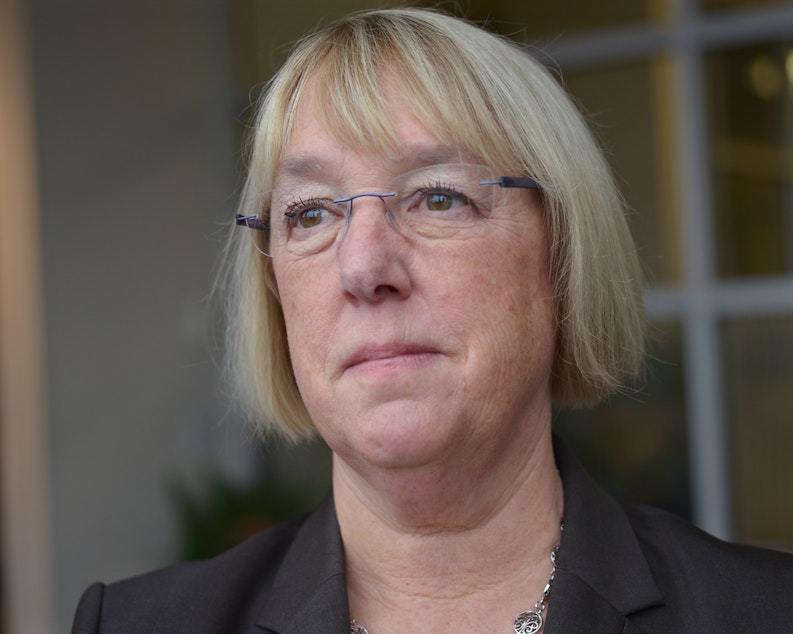After the Capitol insurrection, Sen. Patty Murray says For the People Act is 'critical for our democracy'

In the wake of Donald Trump's lies about the integrity of last year's elections, Republican-controlled state legislatures all over the country are making it more difficult for people to vote. Measures include limiting vote-by-mail, restricting polling places, and even allowing partisan officials to take over election boards.
Washington Senator Patty Murray is a supporter of the For the People Act, which has passed the House and is now before the Senate. It would mandate a number of reforms, including automatic voter registration, and allowing everyone to vote-by-mail. Sen. Murray told KUOW’s Kim Malcolm it is the most important bill the Senate will vote on this session.
This interview has been edited for clarity.
Sen. Murray: I believe that the For the People Act is absolutely critical for our democracy. The reason is because a democracy really is where people participate and make the decisions about their country, about their future, about who they want to be, the policies they have, the investments they make. That is done by people using their voice. Their voice is going to the ballot, or speaking out at meetings, or working as an elected official.
Right now, we are seeing across the country an effort to restrict people's voting capability. When we restrict people's votes, we restrict their voices. A democracy cannot succeed if people are not allowed to speak.
Kim Malcolm: Right now, the Senate does not have the 60 votes needed to pass this law. What options do you have for passing it at this point?
We are going to be voting on this bill next week. We are working extremely hard to get all 50 Democratic senators to vote for it. We will see what happens next week. Then we will determine our next steps. This is a top priority of mine. I'm not going to give up. I'm going to work as hard as I can to get this to the President's desk.
Sponsored
Senator Joe Manchin (D-VA) has described this as a partisan bill, that it will just exacerbate partisan divisions. He's not backing it right now. How do you work on getting him on board?
I believe that Joe Manchin is having discussions with leaders right now about any issues that he has with the bill. I'm willing to listen to see if there are changes that don't limit people's rights to votes. We'll see where we are. We have a few days left, and everybody's working really hard. Again, this is so important that we make sure that partisan state legislatures aren't restricting people's right to vote. This is fundamental to our democracy.
Senator, there are some Democrats and analysts who think that this bill is simply too broad for it to have a realistic chance at passing in a divided Senate. Did the Democrats reach too far here?
No, I think that the package that came to us from the House, along with a number of changes that went through the Senate committee, we will bring it to the floor next week. If we get 60 votes to proceed, members will be allowed to offer amendments on the floor.
This is not the end of the process. This is getting the process to the Senate floor so that we can have our voices heard and make changes if they are necessary, or if they make sense, and our ability to vote on it. That's the procedure that we're working on right now.
Sponsored
The big question, of course, is those 60 votes. If they can be had. You told our listeners, just a few months ago, that you do not support ending the filibuster rule. Do you still feel that way?
Well, I have been very clear that I believe that this bill about voting rights, and the future of our democracy, and people's voices being used, is a circumstance where we have to consider ending what we now see is Mitch McConnell stopping every single vote simply by allowing a member to say, 'I don't support it.' We are looking at a number of ways that we may have to move forward on this issue. I'm very much involved in that process.
Would one of those ways be making an exemption to the filibuster rule just for the For the People Act?
I don't want to jump ahead of myself, but yes. Making an exemption or changing the rules so that it's a talking filibuster-- so that somebody can't just call in from their office and say, ‘I don't feel like having this on this floor today,’ they actually have to work at it — I think that those kinds of values have to be in what we're looking at.
Earlier this month, about 100 democracy scholars from all over the country put out a public letter. It says our entire democracy is now at risk. Do you believe that?
Sponsored
You know, I think I experienced this firsthand on Jan. 6, when we saw armed insurgents come into the Capitol for the sole purpose of stopping an election from moving forward. That said to me that we have a faction in our country who is willing to use brute-force to take over people's voices. We cannot allow that to happen. We can't allow it to happen by people doing what they did on Jan. 6. We can't allow it to happen with our voting rights. That's how strongly I feel about this.
Listen to the interview by clicking the play button above.





